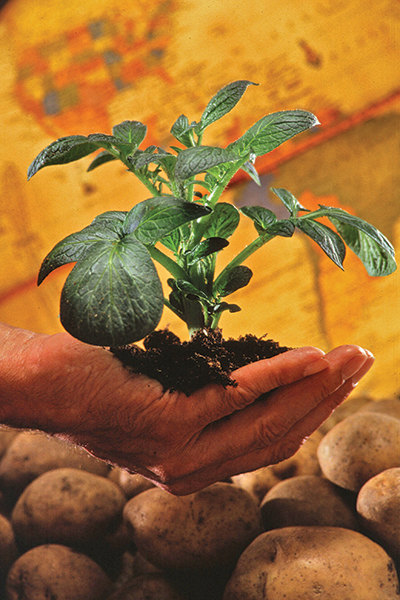JBC: A plant immune system corrects its course
Plant immune systems, like those of humans and animals, face a difficult balancing act: They must mount responses against ever-evolving pathogens, but they must not overdo it. Immune responses require energy and resources and often involve plants killing their own infected cells to prevent the pathogens from spreading.
 Researchers at labs in the UK and the Netherlands studied a receptor protein found in potato plants like this one that detects infection by a virus called potato virus X.Scott Bauer/USDA
Researchers at labs in the UK and the Netherlands studied a receptor protein found in potato plants like this one that detects infection by a virus called potato virus X.Scott Bauer/USDA
Researchers at Durham University in England have identified a crucial link in the process by which plants regulate their anti-viral responses. The research was published in the Journal of Biological Chemistry.
Martin Cann’s lab at Durham, in collaboration with the laboratories of Aska Goverse at Wageningen University and Frank Takken at the University of Amsterdam, studied a receptor protein called Rx1, which is found in potato plants and detects infection by a virus called potato virus X.
Binding to a protein from the virus activates Rx1 and starts a chain of events that results in the plant mounting an immune response. But the exact sequence of cellular events — and how Rx1 activation was translated into action by the rest of the cell — was unknown.
“Our study revealed an exciting, and unexpected, link between pathogen attack and plant DNA,” Cann said.
Specifically, the study showed that Rx1 joins forces with a protein called Glk1. Glk1 is a transcription factor, meaning it binds to specific regions of DNA and activates genes involved in cell death and other plant immune responses. The team found that when Glk1 bound to virus-activated Rx1, it was able to turn on the appropriate defense genes.
When the viral protein was absent, Rx1 seemed to have the opposite effect — actually keeping Glk1 from binding to DNA. In this way, it prevented an inappropriate immune response.
“The immune response involves reprogramming the entire cell and also often the entire plant,” Cann said. “An important part of this regulatory process is not only allowing activation but also making sure the entire system is switched off in the absence of infection.”
More than one-third of the potential global crop harvest is lost to pathogens and pests each year, so breeding plants with better immune systems is an important challenge. Understanding how this immune system is regulated at the appropriate level of activity gives the researchers more ideas of points in the immune signaling pathway that could be targeted to increase the plant’s baseline ability to resist disease.
“To increase (crop) yield, there is an urgent need for new varieties that are resilient to these stresses,” Cann said. “A mechanistic understanding of how plants resist or overcome pathogen attack is crucial to develop new strategies for crop protection.”
Enjoy reading ASBMB Today?
Become a member to receive the print edition four times a year and the digital edition monthly.
Learn moreGet the latest from ASBMB Today
Enter your email address, and we’ll send you a weekly email with recent articles, interviews and more.
Latest in Science
Science highlights or most popular articles

Redefining lipid biology from droplets to ferroptosis
James Olzmann will receive the ASBMB Avanti Award in Lipids at the ASBMB Annual Meeting, March 7–10, just outside of Washington, D.C.

Women’s health cannot leave rare diseases behind
A physician living with lymphangioleiomyomatosis and a basic scientist explain why patient-driven, trial-ready research is essential to turning momentum into meaningful progress.

Life in four dimensions: When biology outpaces the brain
Nobel laureate Eric Betzig will discuss his research on information transfer in biology from proteins to organisms at the 2026 ASBMB Annual Meeting.

Fasting, fat and the molecular switches that keep us alive
Nutritional biochemist and JLR AE Sander Kersten has spent decades uncovering how the body adapts to fasting. His discoveries on lipid metabolism and gene regulation reveal how our ancient survival mechanisms may hold keys to modern metabolic health.

Redefining excellence to drive equity and innovation
Donita Brady will receive the ASBMB Ruth Kirschstein Award for Maximizing Access in Science at the ASBMB Annual Meeting, March 7–10, just outside of Washington, D.C.

Mining microbes for rare earth solutions
Joseph Cotruvo, Jr., will receive the ASBMB Mildred Cohn Young Investigator Award at the ASBMB Annual Meeting, March 7–10, just outside of Washington, D.C.

.jpg?lang=en-US&width=300&height=300&ext=.jpg)